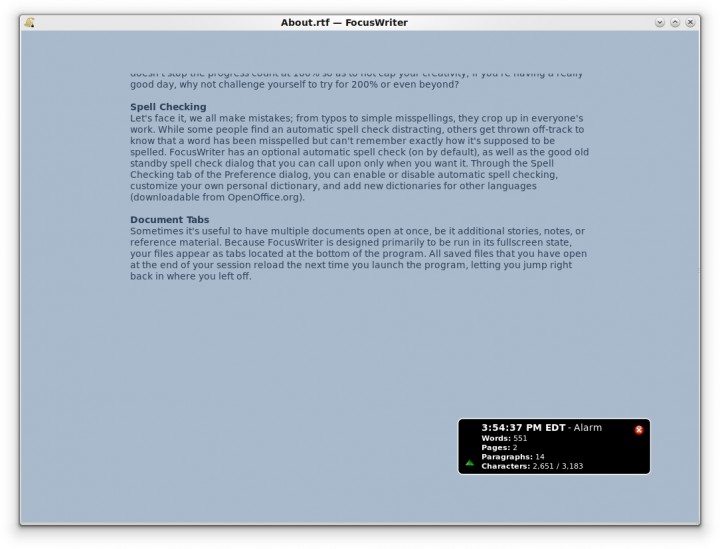
3. FOCUSWRITER SOFTWARE
One of my most popular software projects is my weight-tracking Open Document Spreadsheet, Weight Tracker ODS.
3. FOCUSWRITER PDF
I started with even before I switched to Linux full-time who didn’t want a free office suite with MS-compatibility and PDF export? I’m a big supporter of open formats, and OOo gave us the Open Document standard. Chrome is extensible too- but Firefox has just the right set of tweaks that I want. It’s not a memory hog anymore, and as far as I can tell, it’s no slower than Chrome. I have very few extensions five in fact, and I sync all of my computers with the same settings. I switched back to Firefox at the beginning of the year, wondering how far they’d come since I jumped to Chrome. I lived in the extension-heavy hell of Firefox for years, then leaned down with a focus on bookmarklets, then jumped to Chrome as the hot new thing. In the early days I evangelized about Opera– but then everyone copied their feature set, and opened themselves in ways that Opera just couldn’t keep up with. I have jumped around from browser to browser over the years. (Sounds like something worthy of discussing in its own post). I prefer it over every desktop UI that I’ve ever used. Multiple virtual desktops, with previews exposed by the Super key, along with search and a preview of my open apps.

It lets me manage all of my personal work effortlessly, all from one laptop screen. I fell in love with Gnome 3 and the Gnome Shell. I loved the abandoned pre-Unity “netbook launcher”, so I understood that a new UI paradigm might not be a bad thing- so I buckled down and tested both Unity and Gnome 3 extensively to see what fit. I was skeptical of the trends post-Gnome 2 Unity was slow, customization-poor and untested, while Gnome 3 was taking a risky move away from the Windows-clone icons, desktop and taskbar.

I started with Ubuntu 5.10 “Breezy Badger” and Gnome with it and despite some early dalliances with Ubuntu’s many derivations, I’ve been an Ubuntu user ever since. I liked Debian, but it was always just a bit out of date, and I hated that it installed a lot of redundant stuff (ten text editors, five desktop environments, etc). In college I realized that if I was serious about learning Linux, I needed to use it exclusively. I played with Linux as far back as high-school, but despite multiple partitions and many early distributions, I always came back to Windows. Note: I don’t endorse anything here beyond the implicit “this is what I actually use at home.” The Basics OS: Ubuntu w/ Gnome Shell

In part 1 of this series, I listed all of the tech hardware I use at home now I’ll list all of the software I use on a regular basis. I like to see how people work especially for those whose work is mostly on the computer.


 0 kommentar(er)
0 kommentar(er)
